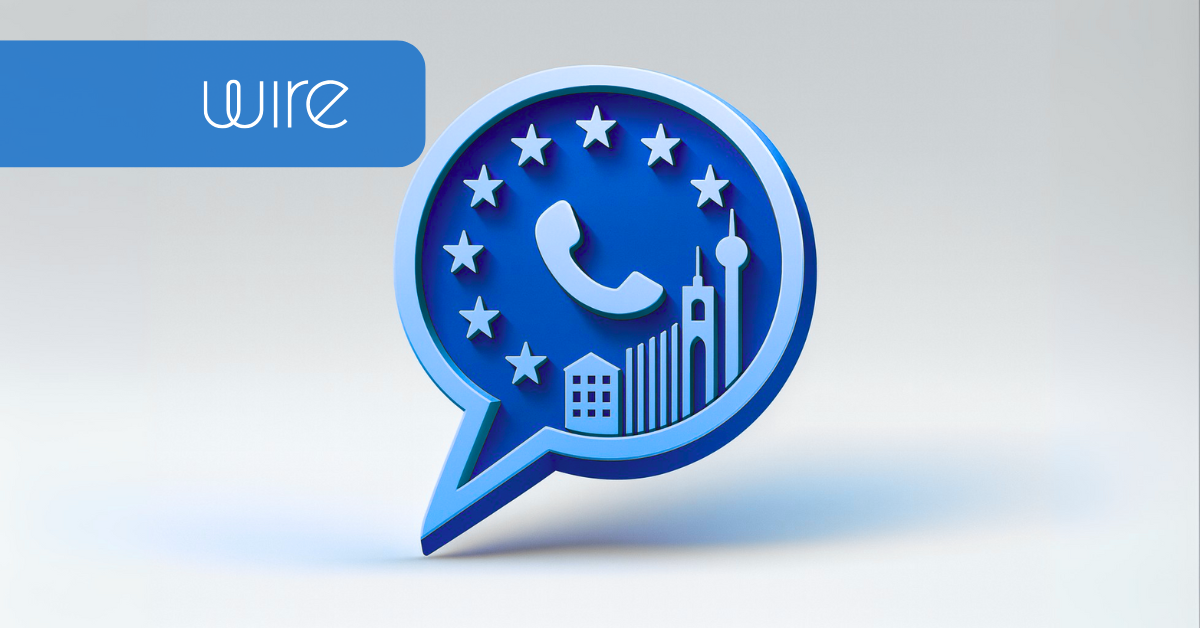EU Alternative to WhatsApp: The Ultimate Secure Messaging Guide for Enterprises (2025)
As the EU doubles down on digital sovereignty, GDPR enforcement, and NIS2 compliance, one thing is clear: WhatsApp is no longer a viable option for secure enterprise communication.
Despite end-to-end encryption for message content, WhatsApp (owned by Meta) still collects metadata, lacks EU hosting, and cannot meet the privacy, governance, and control standards required by European organizations.
This guide compares the leading EU alternatives to WhatsApp, with a deep dive into how Wire leads in security, compliance, and deployment flexibility.
Why Enterprises Are Looking for WhatsApp Alternatives
WhatsApp remains one of the world’s most used messaging apps, but it is fundamentally a consumer product designed to monetize data within the broader Meta ecosystem.
Meta was recently fined €1.2 billion for violating EU privacy laws, raising major concerns for businesses operating in regulated environments.
If your organization needs control over where data resides, how it’s accessed, and how it’s encrypted, it's time to consider an enterprise-grade alternative to WhatsApp. It simply wasn’t built for the demands of secure collaboration and there are many reasons why using WhatsApp for enterprise communication is a terrible idea.
What Is a Secure Messaging App?
A secure messaging platform uses end-to-end encryption and zero trust architecture to protect messages in transit and at rest ensuring that only the intended recipients can access them. These platforms must also meet enterprise requirements for governance, compliance, and usability.
Why WhatsApp Falls Short for European Enterprises and What to Look for Instead
WhatsApp was designed for personal use, not for enterprise-grade communication. While personal chats are end-to-end encrypted, business communications on WhatsApp often are not, especially when routed through Meta or third-party servers. Critical enterprise requirements like federation, legal hold, audit logs, and comprehensive admin controls are simply missing.
For a messaging platform to be a true WhatsApp alternative for European enterprises, it must offer:
- ✅ End-to-End Encryption by default, including backups and metadata
- ✅ GDPR, NIS2 and HIPAA compliance for regulated industries
- ✅ Data sovereignty with European hosting and jurisdiction
- ✅ Federation to support complex organizational structures
- ✅ Open-source transparency for verifiability
- ✅ Enterprise features: Admin controls, SSO, SCIM, legal hold, guest access
- ✅ Built-in Zero Trust Architecture and Post-Quantum Cryptography
Wire meets all these criteria, offering a secure, compliant and future-ready solution designed for the needs of modern European organizations.
Platform Comparison: WhatsApp vs. Leading EU Messaging Alternatives
| Platform |
Wire |
Threema |
Element |
WhatsApp |
| HQ & Jurisdiction |
Germany / Switzerland |
Switzerland |
UK / EU servers |
USA (Meta) |
| E2EE |
✅ |
✅ |
⚠️ Manual |
✅ |
| Metadata Protection |
✅ |
✅ |
⚠️ Partial |
❌ |
| Open Source |
✅ |
⚠️ Client-only |
✅ |
❌ |
| On-Prem Option |
✅ |
❌ |
⚠️ DIY-only |
❌ |
| GDPR/NIS2 Ready |
✅ |
✅ |
⚠️ Variable |
❌ |
| Enterprise Features |
✅ |
⚠️ Limited |
⚠️ Partial |
❌ |
Competitor Breakdown
Threema
Strengths: Swiss privacy laws, anonymous sign-up, always-on E2EE
Weaknesses: No federation, weak desktop usability, no on-prem hosting
Great for privacy-minded users, but limited scalability for enterprise or hybrid teams.
Element (Matrix Protocol)
Strengths: Federation, open-source, developer community
Weaknesses: Complex setup, encryption not default, lacks admin controls
Promising for technically mature orgs, but not ideal for less tech-savvy teams or regulated industries.
Full Competitor Breakdown here.
Final Thoughts: The EU Needs Sovereign Messaging Tools
WhatsApp is not going away, but its utility stops at casual conversation. For organizations across Europe, especially in healthcare, defense, finance or public administration, data protection is non-negotiable.
Wire is the EU alternative to WhatsApp as it is built for teams, enterprises, and government use, offering transparent, open-source, fully end-to-end encrypted messaging, on-prem deployment, and enterprise-grade features like SSO, compliance, and secure federation that gives you security, sovereignty and compliance without compromise.
